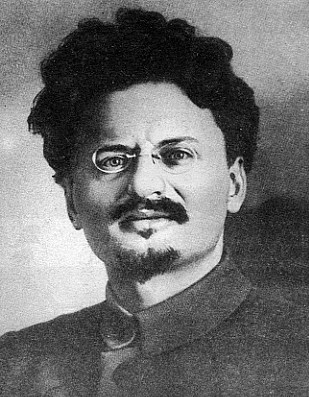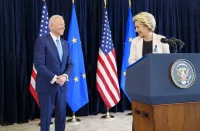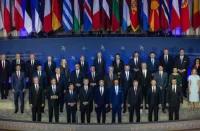Who organized the February and October revolutions in Russia and the November revolution in Germany? The Russian and German revolutions were organized by British intelligence, with the possible support of the United States and France. The goal of WWI was to force the two powers to bleed each other out and eventually spark revolutions there. All sorts of political parties were used to accomplished this end – the Russian Socialist-Revolutionaries, the Cadets, the Mensheviks, Bolsheviks and, in Germany, the disparate Social-Democrats. But not everything went as the British planned. As Germany found its own butcher, Gustav Noske, the Bolsheviks decisively took on the tactic of killing off political opponents. Dropped into Russia by British intelligence, thanks to a secret agreement with German secret services aboard the “closed wagon,” the Bolsheviks refused to leave the political scene. The Bolsheviks, who proved to be talented and ruthless organizers, proceeded to win the Russian Civil War and broke off the leash of their British benefactors.
When the dust from the collapse of the Russian Empire had settled, a new form that emerged to face a stunned British gaze. In the place of the giant, but predictable empire of the tsars, arose a slightly smaller, but totally unpredictable new country – the Union of Soviet Socialist Republics. At its head were leaders who knew all too well the art of coups and revolutions and were thus worthy contenders in political combat.
However, the Soviet Union’s new ideology did not pose a danger in and of itself. In the end, all the slogans, “isms” and configurations of political systems are nothing but mean to achieve the intended goals – they are not an end unto themselves. That is why the Bolsheviks, having shaken up Russia in their rise to power, were forced to continue the policies of their crowned predecessors and quickly made up almost all their lost ground. This was done under the banner of Marxism, but the reasoning had nothing to do with a triumph of the ideas of the bearded Londoner, but rather the logic of geopolitical confrontation and the promotion of national interests.
***
Now consider the situation in our country at the beginning of the 1920’s. The untold riches of Russia were not a secret to the world. Even without making any geological surveys, once can presume that one-sixth of the Earth is not filed with only sand, clay and pebbles and on this vast territory towered the great Russian Empire. As in all other empires, Russia had many problems due to its history, geography and ethnic composition. British intelligence jabbed all of these pressure points. Do not think that Russia collapsed overnight. Subversive activities accumulated against it over the course of months or even years. The work was long (about 100 years), methodical and slow in nature. It began just after the defeat of Napoleon Bonaparte, when Russia became the strongest power on the European continent and ended with the February and October revolutions and the Russian Civil War.
Thus, the crushing of the Russian Empire was complete. But the political struggle has no end. Like politics itself, it was infinite. Therefore, as soon as the USSR began to appear on maps, so did the attempts to erase it. When it happened in 1991, subversive activities were carried out against the Russian Federation. “We should not delude ourselves: until Russia shrinks to the size of Monaco or Luxembourg, they will always try to weaken it and break it to pieces, regardless of the ruling regime or its degree of “democracy” or “openness”. They continue to discuss this endeavor’s scale and financing. In 2007, the United States spent $43 billion on its intelligence agencies. The figures for what Britain spends annually are top secret.
 It was not only the desire to knock off a competitor that drove the Anglo-Saxons to organize the Russian Revolution, but also to dispense of all “liberating” values. But it turned out quite differently. With Lenin at their head, the Bolsheviks unexpectedly to all (including themselves) put Russia back together again. By the time the founder of the Soviet government died in 1924, everything was still very fragile. The economy had to be rebuilt and on this point a struggle erupted in the USSR between two ideas, two individuals, two philosophies on how to develop the country. As Lenin lay in his coffin, Josef Stalin and Leon Trotsky went at it, fighting over who would win supremacy over the Communist Party and the right to direct the country for themselves. There is no need to recite details of these leaders’ biographies and all the twists and turns in within Soviet politics, there are already thousands of books on this subject. What interests us is understanding the key moments of this clash, and what it meant, because this battle within the offices of the Kremlin, far from Munich, played a major part in the fate of a then unknown German corporal – Adolf Hitler.
It was not only the desire to knock off a competitor that drove the Anglo-Saxons to organize the Russian Revolution, but also to dispense of all “liberating” values. But it turned out quite differently. With Lenin at their head, the Bolsheviks unexpectedly to all (including themselves) put Russia back together again. By the time the founder of the Soviet government died in 1924, everything was still very fragile. The economy had to be rebuilt and on this point a struggle erupted in the USSR between two ideas, two individuals, two philosophies on how to develop the country. As Lenin lay in his coffin, Josef Stalin and Leon Trotsky went at it, fighting over who would win supremacy over the Communist Party and the right to direct the country for themselves. There is no need to recite details of these leaders’ biographies and all the twists and turns in within Soviet politics, there are already thousands of books on this subject. What interests us is understanding the key moments of this clash, and what it meant, because this battle within the offices of the Kremlin, far from Munich, played a major part in the fate of a then unknown German corporal – Adolf Hitler.
Breaking down all the demagoguery between these two party leaders into simple and understandable phrases, their disagreement was as follows: Trotsky believed that the Russian Revolution was not the goal, but rather a means of igniting revolution in more developed countries in order to bring about a communist victory worldwide. Stalin’s idea was that the victory of the Bolsheviks in Russia was a unique phenomenon valuable unto itself, and the most important task ahead was to finish establishing a socialist state liberated from the free market, rather than focus on exporting the revolution elsewhere.
The battle for the party revolved around this ideological core. Trotsky declared, “The creation of a independent socialist society was impossible for a single country in the world” and therefore called for an external revolutionary war. “The Socialist revolution,” he wrote, “begins at the national level, develops to the international, and is completed at the global level. Thus, the Socialist revolution is permanent in a new, broader sense of the word: it does not receive its completion until the final triumph of a new society on our entire planet.”
Stalin and his supporters objected, accusing the author’s theory of permanent revolution as a subversive attempt to split the party: We can and must build socialism in the USSR. But in order to build socialism, we need above all to exist. We need a chance to breath before another war, we need to ensure there will be no attempts at outside intervention; we need to fight for a certain minimum of international stability … “ In response, Trotsky used all his talent as a orator and polemicist to overshadow his less eloquent opponent. The speeches and statements of Stalin and Trotsky’s time were mostly devoted to mutual accusations. After presenting their arguments, each went on to attack the other. In this battle, the ultimate weapon was quoting Lenin, because everyone knows that if you want, you can dig up anything. Going through the two opponents’ arguments would be useless, they were boring and would put even the most interested reader to straight to sleep. It’s more important to answer a different question: what really happened to the Soviet party elite? What is behind this (seemingly) theoretical dispute between Stalin and Trotsky?
Historians have tried to peel back the tons of semantic husk produced by the contenders in this discussion to try and find a single kernel of sense. But the truth lies elsewhere. It’s in the biographies of Stalin and Trotsky; it’s in the origins of our revolution. It’s even in the places where these future opponents were on the eve of the Russian Empire’s collapse and how they ended up at the top of the Bolshevik party.
At the time of the February revolution, Josef Stalin was in exile in Siberia. The provisional government gave him amnesty and allowed him to simply board a train to Petrograd. The hot-headed Georgian later became a staunch supporter of Lenin, dutifully carrying out all of the leader’s instructions, and became directly involved in the organization of the October revolution. But, he had nothing to do with the obscure financial support that flowed into the Bolshevik Party.
 Trotsky was a different story. At that same time in February, he was in faraway America, where, in his own words, he was doing nothing. Trotsky’s profession was to be a professional revolutionary. Apparently this sort of work pays extremely well, as Trotsky returned to the Motherland with $10,000 in his pockets. Today, now that the ole’ greenbacks have devalued considerably, this amount seems laughable, but at the turn of the century American currency was a force. Therefore, in present-day terms this amount was worth 20-30 times as much – and this was just what he had tucked in his pocket, mind you. For incidentals, so to speak. The main funding supplied to the Russian Revolution from American bankers was transferred through accounts in neutral Sweden and briefcases of inconspicuous figures stealthily entering the country. No one disputes that Vladimir Lenin was brought home in the “closed wagon” with a bulging suitcase full of cash. No, it is an indisputable fact that the Bolsheviks were swimming in money. Who gave it to them? The Germans? Partly, but it should be understood that a substantial part of Lenin’s “German” money originated from American loans given out to German government. Just like Lenin, Trotsky was connected to some dark circles and had relationships with various intelligence agencies. Having returned to their homeland, Trotsky and Lenin quickly teamed up, instantly forgetting their past enmity. It should be noted that Trotsky joined the Bolshevik Party only in the summer of 1917, however, in organizing the October uprising, he put in more effort than any other Bolshevik leader, Lenin included.
Trotsky was a different story. At that same time in February, he was in faraway America, where, in his own words, he was doing nothing. Trotsky’s profession was to be a professional revolutionary. Apparently this sort of work pays extremely well, as Trotsky returned to the Motherland with $10,000 in his pockets. Today, now that the ole’ greenbacks have devalued considerably, this amount seems laughable, but at the turn of the century American currency was a force. Therefore, in present-day terms this amount was worth 20-30 times as much – and this was just what he had tucked in his pocket, mind you. For incidentals, so to speak. The main funding supplied to the Russian Revolution from American bankers was transferred through accounts in neutral Sweden and briefcases of inconspicuous figures stealthily entering the country. No one disputes that Vladimir Lenin was brought home in the “closed wagon” with a bulging suitcase full of cash. No, it is an indisputable fact that the Bolsheviks were swimming in money. Who gave it to them? The Germans? Partly, but it should be understood that a substantial part of Lenin’s “German” money originated from American loans given out to German government. Just like Lenin, Trotsky was connected to some dark circles and had relationships with various intelligence agencies. Having returned to their homeland, Trotsky and Lenin quickly teamed up, instantly forgetting their past enmity. It should be noted that Trotsky joined the Bolshevik Party only in the summer of 1917, however, in organizing the October uprising, he put in more effort than any other Bolshevik leader, Lenin included.
In other words, Leon Trotsky was representing American investment (or Anglo-Saxon intelligence) in the new revolutionary Russia. Therefore, he took the appropriate actions and expressed the appropriate ideas…
It’s enough to cite a single fact about Comrade Trotsky and all becomes clear. In the early 20’s, he headed the People’s Commissariat of Communications. It was under his leadership that this organization contracted with Swedish firm Nydkvist and Holm for a massive purchase of steam locomotives.
Everything about this order is interesting. Firstly, the quantity – 1,000 locomotives. Secondly, the price – 200 million gold rubles. The other details are no less curious. It’s no secret that Sweden is not a habitat for elephants, but the fact that the Scandinavian country is far from being the world leader in locomotive production also somehow escaped everyone. Nydkvist and Holm did not even have the production capacity to meet the Soviet order at the time. Therefore, the two sides agreed to a transaction under this scheme: Red Russia would pay up front, the Swedes would then build factories, and then send us the locomotives.
In the entire history of the firm, Nydkvist and Holm had never produced more than 40 locomotives per year. But, it decided to muster its strength and produced as many as 50 in 1921! Further down the road, the order was distributed evenly over the course of five years, during which the Swedes used our money to build a factory! In 1922, the buyer received 200 locomotives, and from 1923-1925 it received 250 per year. In addition, the Soviet Union played the role of not only the buyer, but also the lender in this deal. And this had nothing to do with an advance payment for the locomotives. In May 1920, the firm received not only an advance of 7 million Swedish krona, but also an interest-free loan of 10 million krona “for the construction of a machine shop and boiler room.” According to the loan agreement, this was to be repaid upon delivery of the final 500 locomotives. Had the Soviet order been reduced, then the Swedes could have easily kept the money! For example, the Swedish side could have delayed the shipment, and the text of the document did not provide for cases in which the contract with the Swedish company could be terminated.
But that’s not all. The locomotives were ordered at twice the pre-war price – and they were not bought in depreciating currency, but gold rubles! It was quite a scandalous picture: excessive price, advance payment, no goods. And when would they arrive? Who knows? Any tax inspector or auditor who saw anything like this would begin to lick his chops. The deal smelled like a huge scandal and major promotion for anyone who uncovered the fraud.
The Soviet magazine, Economist, wrote about the strange deal in 1922. The article expressed bewilderment over such a strange way to do business. Furthermore, Frolov, the author, posed a logical question: why was it necessary to order the locomotives from Sweden in the first place? Would it not be better to develop, or rather, advance domestic industry? The Putilov firm in Petersburg produced 250 locomotives per year before the war. Why not give it a loan? Such an enormous sum of money could “enhance all of its locomotive plants and feed its workers.”
Does such odd management by Comrade Trotsky surprise you? You’d be even more surprised by Lenin’s reaction to this Economist article. “These are clearly all counter-revolutionaries, Entente henchmen, organized by servants and spies attempting to influence our youth. We must see to it that we capture and continue to constantly, systematically capture these “military spies” and send them back”, the leader of the proletariat wrote. He then asked Felix Dzerzhinsky, head of the Cheka secret police to close the magazine.
But back to the price of this deal that was so unprofitable for Russia and that is forbidden to criticize: 200 million gold rubles – that is not only a colossal sum. It was a quarter of the country’s gold reserves at the time!
So what does this strange behavior of Lenin and Trotsky really mean? It means that debts must be paid, and promises kept. The money spent on Russia’s collapse had to be returned. This was one of the agreements between the representatives of Western governments and the Bolsheviks. Because Lenin remained in power for so long, he broke his agreements with his “partners” in British intelligence only gradually, and in the end it was only a few. Having been put at Russia’s helm only to ruin it, he used this cover to do the opposite — sew its territory back together. Hence the logic of his actions. We will not pay off the Tsar’s debts. We will make concessions. We will not give up our authority, and the spent money will be returned.
So, with Trotsky it is more or less understood. What does Hitler have to do with this? We’ll get to that in the next chapter.
ORIENTAL REVIEW publishes exclusive translations of the chapters from Nikolay Starikov’s documentary research ““Who Made Hitler Attack Stalin” (St.Petersburg, 2008).
PREVIOUS EPISODES
Episode 5. Who paid for World War II?
Episode 4. Who ignited First World War?
Episode 3. Assassination in Sarajevo














Pingback: Episode 6. Lev Trotsky, the Father of German Nazism (I) | Oriental Review
Pingback: Episode 6. Leon Trotsky, Father of German Nazism (III) | Oriental Review
Pingback: Episode 6. Leon Trotsky, Father of German Nazism (V) | Oriental Review
Pingback: Episode 6. Leon Trotsky, Father of German Nazism (IV) | Oriental Review
“Who organized the February and October revolutions in Russia and the November revolution in Germany? The Russian and German revolutions were organized by British intelligence, with the possible support of the United States and France”
This sounds foolish. At the time most of pundits said the contrary, that it was Germany behind, as Russia opted for a separate peace. As it turned out, according to an overwhelming majority of historians (and history as a discipline is a serious matter), the Russian and German Revolutions were internal processes. That exists also, in History, the really shifting moments have an internal dynamics. There are conspiracies too, of course. But when whole nations are involved, they remain at best a footnote. The deciders are within the movement, are more often than not anonymous, and all those who seek to use it are easily brushed aside by the force of the hurricane… Only the survivors will tell of it, but the end result has little to do with the original script.
At the beginning there may have been external factors, but they will prevail only if the process is weak and short-lived.
@Enrique
Thank you for contribution. I’m afraid you have a bit simplistic understanding of historical process. The British Empire had two principle rivals on European continent at the beginning of XX century: Russia and Germany. The British task was to clash them with each other. Please read my post on the story of this intrigue of June-July 1914: Episode 3. Assassination in Sarajevo.
A revolution is of course not a matter of direct foreign intrusion. Any smart player (British intelligence is such without doubt) monitors the situation and supports (financially, morally etc) the most promising anti-governmental movement caused by internal grievances or morbid ambitions etc. In Russian case they supported bolshevics since the origin of Social-Democratic party. The facts are abundant.
Now, when the process is launched and moreover is entering the decisive phase, there is a need to perform a ‘cover operation’ of your involvement switching it to another side. In 1917 such operation was a famous ‘Lenin sealed train’ transit through Germany. Indeed, many historians believe Germans arranged Russian revolution. They make such conclusion out of the fact that the train passed through German territory, nothing else! But few remember that there was a secret agreement between British and Germans over this voyage that eventually led to October revolution in Russia. Germans believed British were betraying Russian allies in their favor. At the end of the day both Empires collapsed… So the course of History proved who was really interested in revolution in Russia…
Pingback: Mad Russians and the American Left « The Spanish Prisoner
None of the allegations about Trotsky’s financial activities are backed with citations. Actually, nothing in the large part of this work that I have read is backed with citations. But even if all the factual assertions made in this chapter, ‘Leon Trotsky, Father of German Nazism’, were true, none of them would provide any basis for the assertion made in the chapter title.
@Aaron: Thank you for the comment. What exact fact in Trotsky’s biography would you like to be supported with a citation?
Regarding the chapter title – indeed, Hitler is not mentioned in this particular part. Please read Part III and consequent parts of the Episode. You will enjoy a thrilling discovery, completely backed by citations :)
Two things:
1. Who controls British Intelligence?
2. America has become increasingly Trotskyite from FDR to the present day; now usually through “neocons” whose method is permanent warfare rather than just permanent revolution.
Pingback: L’Europe d’une guerre à l’autre (VI – 2) – Léon Trotsky, père du nazisme allemand | Réseau International
all working (wonking) for masonry, period
Pingback: Breaking Down Bannon's Betrayal Of Trump | OrientalReview.org
Pingback: Breaking Down Bannon's Betrayal Of Trump – Wall Street Karma
Pingback: Breaking Down Bannon’s Betrayal Of Trump | Investing Daily News
Pingback: Breaking Down Bannon's Betrayal Of Trump
Pingback: Breaking Down Bannon's Betrayal Of Trump | ProTradingResearch
Pingback: Breaking Down Bannon’s Betrayal Of Trump | Real Patriot News
Pingback: Breaking Down Bannon's Betrayal Of Trump – TradingCheatSheet